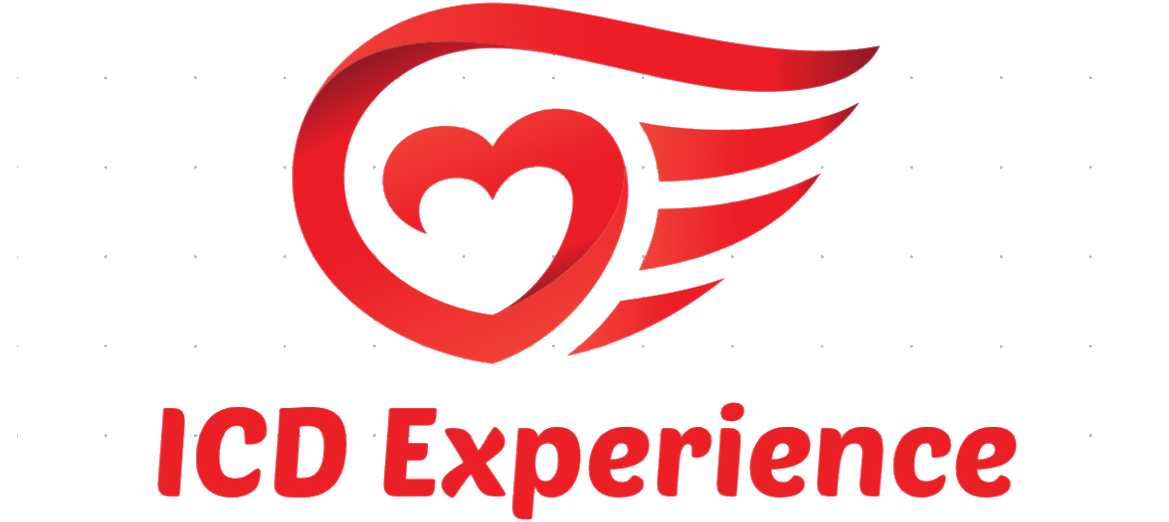From Crisis to Clarity
With my first experience of ventricular tachycardia, fully conscious and terrified, I had no idea what an implantable cardioverter defibrillator even was. The second experience, I was told this small device had just saved my life. That shock, both physical and emotional, sparked my journey of understanding and embracing life with an ICD. Today, I’m sharing everything I’ve learned about the powerful role these devices play in modern heart treatment.
This article breaks down how ICDs work, what makes them life saving, and how they’re evolving into some of the most advanced tools in cardiovascular care.
What Is an ICD and What Does It Do?
An implantable cardioverter defibrillator (ICD) is a small, battery powered medical device implanted under the skin, typically near the collarbone. It constantly monitors your heartbeat and steps in if it detects dangerous rhythms.
If your heart suddenly races or flutters erratically, the ICD can correct the issue using:
-
Antitachycardia pacing (ATP): Gentle electrical pulses that interrupt fast rhythms
-
Cardioversion: A moderate electrical shock to reset the heart rhythm
-
Defibrillation: A high energy shock to stop life threatening arrhythmias like ventricular fibrillation
Unlike external defibrillators, ICDs work from inside your body, delivering real time intervention — often without you even feeling it.
Why ICD Devices Matter in Today’s Cardiac Treatment Plans
Heart disease remains the number one cause of death globally, and sudden cardiac arrest is one of the most deadly outcomes. ICDs are at the frontline of defense for those most at risk.
According to the Cleveland Clinic, ICDs significantly reduce the risk of sudden cardiac death in patients with prior episodes of arrhythmia or those with weakened heart muscle. This makes them a cornerstone of both emergency prevention and long term heart management.
How Do Implantable Cardioverter Defibrillators Work?
The device is connected to your heart through thin, insulated wires called leads. These leads pick up every electrical signal in your heart and transmit it to the ICD. If the rhythm goes haywire, the ICD decides the best course of action in seconds.
What’s amazing is the autonomy. You don’t need to press a button. You don’t even need to notice something is wrong. The device makes the call and acts immediately.
Many ICDs are combined with pacemakers, offering both fast and slow rhythm regulation. So whether your heart speeds up or slows down too much, the device can handle it.
The Emotional and Physical Benefits of Living With an ICD Device
Emotional Safety and Mental Health
One of the biggest unspoken benefits of living with an ICD device is emotional peace of mind. When I was first diagnosed, I feared being alone, going to sleep, or even working out. But once I learned how the ICD functions and trusted its monitoring, I felt safe again.
Patients often report a noticeable reduction in anxiety and an increase in confidence. The ICD becomes a silent partner in your survival.
Returning to Daily Life and Activity
With your doctor’s guidance, you can return to everyday life, work, and even exercise. While contact sports may have some restrictions, walking, swimming, hiking, and biking are often encouraged. Your ICD is designed to keep up with your heart, even when it’s racing for healthy reasons.
See our guide on safe exercises for ICD patients to learn what’s right for your stage of recovery.
Travel, Work, and Social Confidence
I’ve traveled across Canada and the United States, gone to live concerts, and hiked mountains since getting my ICD. It took planning, but it was possible and empowering. You don’t have to stop living. You just need to adapt smartly. Our travel tips for ICD patients can help you get started.
Advancements in ICD Technology That Are Changing Lives
Technology never stands still and neither do ICDs. Some of the most important advancements in ICD technology include:
Remote Monitoring
Modern ICDs are wirelessly connected to transmit data to your care team. This allows:
-
Fewer in person appointments
-
Early detection of abnormal trends
-
Better follow up care
Remote monitoring ensures that your cardiologist can catch problems before they become emergencies. It’s also more convenient for patients with busy lives or mobility challenges. Johns Hopkins Medicine supports remote monitoring as a standard of care for long term ICD management.
Smart Algorithms and Machine Learning
Today’s devices use artificial intelligence to detect arrhythmia patterns and prevent unnecessary shocks. These smart algorithms learn from your heart data and get better over time. The result is more accurate therapy and fewer interruptions.
Miniaturization
The newest generation of ICDs are smaller, thinner, and less visible. This not only makes them more comfortable but also expands eligibility for younger, smaller, or high risk patients. Smaller size also usually means a less invasive procedure and quicker recovery.
Extended Battery Life
Early ICDs needed replacements every five to seven years. Now, some models last over a decade. There’s even research into energy harvesting from the body’s motion, potentially eliminating the need for replacement surgeries.
Education, Support, and Mental Wellness for ICD Patients
Getting an ICD is more than a procedure. It’s a lifestyle shift.
Learn as Much as You Can
After my implantation, I dove into resources about device care, ICD shock expectations, and physical limitations. The more I knew, the less I feared. Knowledge is freedom.
We’ve created a full guide to living with an ICD that walks you through daily routines, device checks, and how to talk with your cardiologist.
Join a Support Community
There’s no substitute for talking to people who get it. I joined online forums, ICD Facebook groups, and eventually started sharing my own story on ICD Experience. Feeling connected makes you feel capable.
Mental Health Still Matters
Even if your heart is protected, your mental health needs care too. Living with an ICD can bring fear, depression, or post shock anxiety. Therapists and support groups familiar with chronic illness can make a world of difference.
Read our category on managing anxiety with an ICD for actionable strategies.
What the Future Holds for ICDs in Cardiac Care
The future of ICDs is more personalized, more connected, and more patient centered.
Wearable Integration
ICDs may soon sync with everyday fitness trackers, allowing patients and doctors to view real time data alongside step counts, sleep metrics, and more.
Predictive Alerts
Using advanced analytics, future ICDs could alert your care team to subtle changes in heart rhythm days or weeks before symptoms arise.
Personalized Therapy Delivery
Imagine an ICD that adapts its pacing and shock energy to your unique heart behavior over time. That’s the vision — and it’s getting closer.
Global Access and Equity
There’s also growing work being done to expand ICD access worldwide. Organizations are focusing on affordability, training, and system integration to bring life saving technology to underserved areas.
Frequently Asked Questions About Modern ICD Devices
An ICD monitors your heartbeat and delivers therapy if a life threatening rhythm is detected. It helps prevent sudden cardiac death by quickly restoring a normal rhythm through pacing or shock.
Most modern ICDs last between 8 to 14 years depending on the model, battery size, and how often it delivers therapy. Newer devices are more energy efficient and designed for longer use.
You typically will not feel the ICD working unless it delivers a shock. Regular monitoring and anti tachycardia pacing are often unnoticeable to the patient.
Defibrillation shocks can feel like a strong kick in the chest. They are brief but intense, and while startling, they are designed to save your life in critical moments.
Yes. After getting medical clearance, most people with ICDs can return to physical activity. Walking, cardio, and strength training are often encouraged with proper supervision. What is the main purpose of an implantable cardioverter defibrillator?
How long do implantable cardioverter defibrillators typically last?
Can you feel your ICD working during normal heart monitoring?
Are shocks from an ICD painful?
Is it safe to exercise with an implantable cardioverter defibrillator?
Final Thoughts: ICD Devices Are More Than Technology
Having an ICD is not just about preventing death. It’s about reclaiming life. These devices offer hope, independence, and control in a world that once felt unpredictable.
Thanks to incredible advancements in ICD technology and growing awareness, more people are thriving, not just surviving. If you or a loved one is exploring life with an ICD, know this: you are not alone, and the journey gets easier. With the right tools, information, and support, you can live boldly.
Explore more on ICD Experience or read my full story in the book Understanding ICD Implants: A Comprehensive Guide.
What is the main purpose of an implantable cardioverter defibrillator?
An ICD monitors your heartbeat and delivers therapy if a life threatening rhythm is detected. It helps prevent sudden cardiac death by quickly restoring a normal rhythm through pacing or shock.
How long do implantable cardioverter defibrillators typically last?
Most modern ICDs last between 8 to 14 years depending on the model, battery size, and how often it delivers therapy. Newer devices are more energy efficient and designed for longer use.
Can you feel your ICD working during normal heart monitoring?
You typically will not feel the ICD working unless it delivers a shock. Regular monitoring and anti tachycardia pacing are often unnoticeable to the patient.
Are shocks from an ICD painful?
Defibrillation shocks can feel like a strong kick in the chest. They are brief but intense, and while startling, they are designed to save your life in critical moments.
Is it safe to exercise with an implantable cardioverter defibrillator?
Yes. After getting medical clearance, most people with ICDs can return to physical activity. Walking, cardio, and strength training are often encouraged with proper supervision.













5 Comments